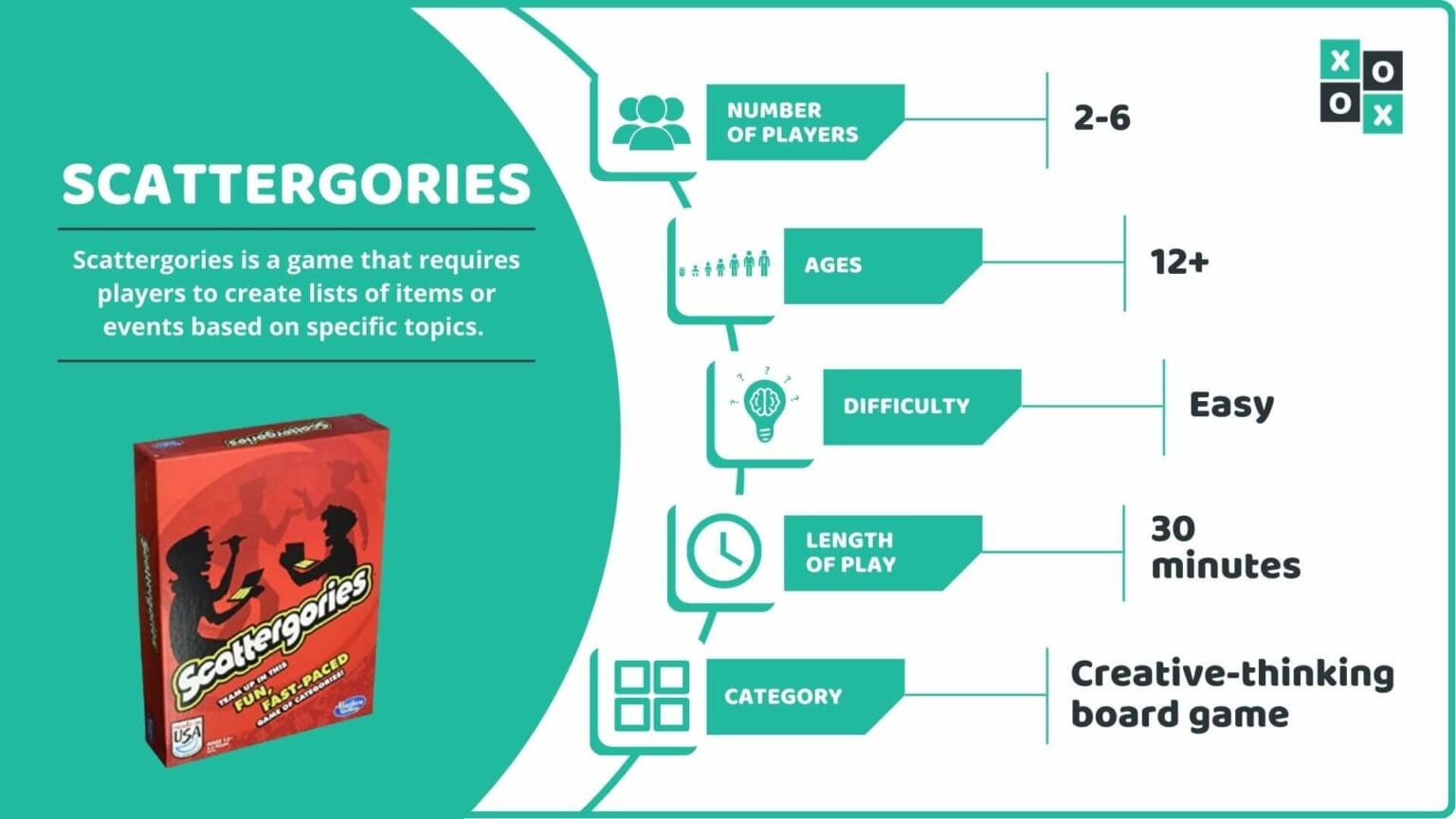Gather your friends and family for a whirlwind of words! Scattergories is the perfect party game—easy to learn, yet challenging to master. This guide dives into the ins and outs, from scoring to winning strategies, equipping you to conquer your next game night.
Quickstart Guide to Scattergories
Scattergories, the beloved Hasbro word game, challenges players to think fast and creatively. The goal? Race against time to conjure unique words or phrases fitting specific categories and starting with a designated letter. Sounds simple enough, but mastery requires strategy and a dash of word wizardry.
How to Play
Designed for two or more players (generally ages 13+), Scattergories unfolds in rounds. Each round presents a list of 12 categories (e.g., “Things in the Kitchen,” “Types of Music”) and a randomly selected letter. Players have a limited time (usually two or three minutes) to fill their answer sheets. Check out the ultimate guide of scattergories list and use it to enhance your gameplay.
Answer Guidelines
Valid answers must adhere to specific rules:
First Word Rule: The first word must begin with the round’s letter. “Blueberries” for “Fruit” works if the letter is “B.”
Ignoring Articles: Articles (“a,” “an,” “the”) don’t affect the first-letter rule. “The Cat” is acceptable for “Animals” if the letter is “C.”
No Repeats: An answer can only appear once per round, even if it fits multiple categories. “Bacon” can’t be used for both “Breakfast Foods” and “Things You Fry.”
One Shot Per Category: Each category allows only one answer per round. Choose wisely!
Scoring & Winning
Uniqueness is key to scoring. A point is awarded for each answer not duplicated by other players. Duplicate answers earn no points. Disputes over answer validity are typically resolved with a dictionary. The player with the most points after all rounds wins.
Winning Strategies
Dominating Scattergories requires more than just a vast vocabulary:
- Prioritize Easy Categories: Start with categories you can answer quickly to maximize points within the time limit.
- Think Outside the Box: Uncommon words are often more unique. Just ensure they’re valid!
- Predict Opponents: Try to anticipate their answers to avoid duplicates. It becomes a strategic mind game!
Variations & House Rules
Scattergories is highly adaptable. Create house rules to personalize the game:
- Themed Categories: Center categories around a specific theme (movies, books, etc.).
- Proper Nouns: Decide whether to allow or disallow them.
- Scoring Tweaks: Award bonus points for longer or more creative answers.
Scattergories Goes Digital
Online versions enable remote play, complete with timers, digital answer sheets, and leaderboards. Enjoy the funniest and wittiest pickleball puns for your social media captions and group chats.
Essential Scattergories Rules
Ready to delve deeper into the nuances of Scattergories? Let’s explore the finer points and strategies that transform novices into word wizards.
Gameplay Breakdown
The Letter: A randomly selected letter dictates the round’s answers. This element of chance ensures each game is unique.
The Timer: The race against time (typically three minutes) demands quick thinking. It’s a mental sprint to maximize answers before the buzzer.
The Showdown: Players reveal their answers category by category. Duplicate answers are eliminated, highlighting the strategic importance of unique responses.
Scoring: Originality Wins
Points are awarded only for unique answers. This encourages players to explore less conventional words and phrases.
Illegal Answers
While creativity is encouraged, some restrictions apply. Proper nouns are generally disallowed unless specifically requested by a category. Articles (“a,” “an,” “the”) and hyphenated words are typically off-limits.
Rule Variations
Scattergories is flexible. Teams, themed category lists, and point multipliers are just a few possible variations.
Advanced Strategies
Elevate your game with these tactics:
Strategic Category Selection: Prioritize easier categories to accumulate points quickly.
Anticipating Common Responses: Predict other players’ answers to avoid duplicates.
Letter Awareness: Mentally prepare by brainstorming words starting with the chosen letter before the timer begins.
Embracing Ambiguity: Some vague categories allow for creative interpretation, but carry the risk of invalid answers.
Setting Up Scattergories at Home
Planning a Scattergories showdown at home? Excellent! Here’s your guide to a smooth and engaging game night.
Essential Supplies
- Players: Two to six is ideal.
- Writing Utensils: Pencils and paper suffice.
- Timer: A kitchen timer, stopwatch, or even a sand timer will do.
- Letter Generator: A die, online generator, or deck of cards can randomly select the letter.
- Category List: Pre-made lists are readily available online, or create your own!
Gameplay: Step-by-Step
- Letter Selection: The “Letter Master” determines the round’s letter.
- Timer Setup: Set the timer (three minutes is recommended).
- Wordsmithing: Players write words fitting each category and starting with the letter.
- Pencils Down: Writing stops when the timer buzzes.
- Answer Comparison: Players share answers. Duplicates are eliminated.
- Scoring: Each unique answer earns a point.
- Repeat: Play multiple rounds with different letters.
- Winner: The player with the highest total score wins.
Strategies & Secrets
Think Outside the Box: Unexpected answers can be the most rewarding.
Strategic Thinking: Anticipate common answers and choose alternatives.
Have Fun: Relax and enjoy the wordplay!
Can You Use the Same Word Twice in Scattergories?
Can you use the same word for multiple categories in Scattergories? While tempting, the official rules prohibit this.
The game emphasizes diverse and creative answers. Reusing a word, even if it fits multiple categories, diminishes the challenge and the opportunity to explore your vocabulary.
Example: If the letter is “C” and the categories include “Countries” and “Things that are Cold,” you can’t use “Canada” for both. You’d need a different “C” word for one category.
Why the Rule Exists: This rule prevents repetitive answers and encourages broader thinking. It’s about balancing cleverness with variety.
Accidental Duplicates: If you accidentally write the same word twice, one entry is invalidated. Double-check your list before time runs out.
House Rules: Some groups may allow duplicate words, but official rules prohibit them. It’s essential to clarify this before the game begins.
| Scenario | Word | Category 1 | Category 2 | Allowed? |
|---|---|---|---|---|
| Duplicate word | Apple | Fruit | Food | No |
| Unique words | Apple | Fruit | Things that are Red | Yes |
| Duplicate word, different form | Run (verb) | Action | Run (noun) | Probably No * |
| Closely related words | Running (verb) | Action | Runner (noun) | Maybe, check with other players |
- Words with different meanings depending on usage can be debated. Clarify with other players or consult a rulebook.
While official rules discourage duplication, house rules can always be implemented. Perhaps a bonus could be awarded for a word that fits multiple categories if used only once.
Key Points:
Gameplay: Race against time to write unique words fitting specific categories and starting with a given letter.
First Word Rule: The initial word must begin with the assigned letter. Articles are ignored.
No Repeats/One Answer per Category: Avoid duplicate answers within a round. One answer per category.
Scoring: Unique answers earn points. Duplicates get zero points. Challenges are resolved with a dictionary.
Strategies: Prioritize easier categories, think creatively, and anticipate opponents’ answers.
Variations: Use themed categories, adjust proper noun usage, and customize scoring.
Digital Play: Online versions allow remote play with timers and leaderboards.
Objective: Score the most points by providing unique answers.
Players: 2-6 players (or teams).
Rounds: Typically three.
Materials: Scattergories game set or DIY version with timer, letter generator, and category lists.
Gameplay:
- Letter Selection: Randomly determine the round’s letter.
- Timer Start: Set the timer (usually 3 minutes).
- Brainstorming: Write answers.
- Timer Stop: Stop when the timer ends.
- Scoring: Compare answers. Only unique answers score points.
Illegal Answers: Proper nouns (unless specified), words starting with articles, and hyphenated words are usually prohibited.
Variations: Allow proper nouns, use themed lists, incorporate point multipliers, and play in teams.
Unique Insights & Untapped Potential: Explore cognitive benefits, educational uses, advanced strategies, and community-generated lists in your writing.
- Revolution Space: Disruptive Ion Propulsion Transforming Satellites - April 24, 2025
- Race Through Space: Fun Family Game for Kids - April 24, 2025
- Unlocking the Universe: reading about stars 6th grade Guide - April 24, 2025

















2 thoughts on “Scattergories Rules Decoded: A Comprehensive Guide to Scoring, Acceptable Answers, and Winning Strategies”
Comments are closed.